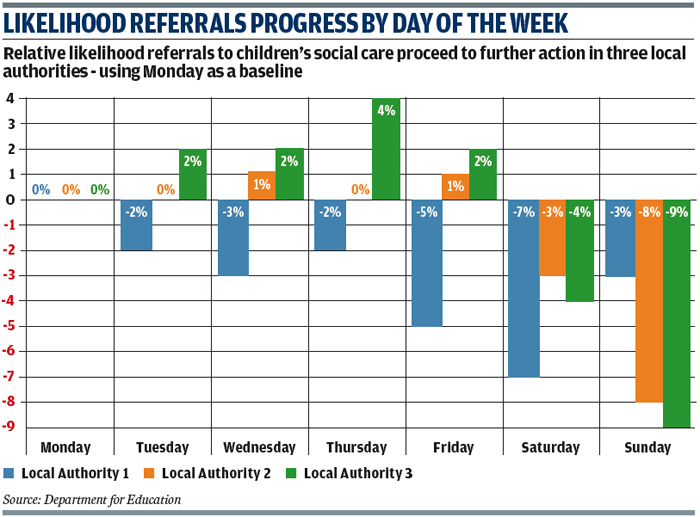Research Report: Decision making in Children's Social Care - Quantitative Data Analysis
Charlotte Goddard
Tuesday, September 27, 2016
The Behavioural Insights Team was commissioned by the Department for Education to identify factors that might affect social workers' ability to make decisions.
Authors Alex Tupper, Ross Broad, Natalia Emanuel, Andy Hollingsworth, Susannah Hume, Chris Larkin, Janna Ter Meer and Michael Sanders
Published by Department for Education, July 2016
SUMMARY
Professional decision making in social work can be influenced by a range of factors, including the availability of information and resources. The Behavioural Insights Team, a social purpose company jointly owned by the government, charity Nesta, and its own employees, was commissioned by the Department for Education to identify factors that might affect social workers' ability to make decisions.
The project involved analysis of data on around 49,000 children who were referred to children's social care at three English local authorities between 1 July 2010 and 30 June 2014. The researchers looked at how variables such as the day of the week a referral was received affected the way the case progressed through the system. The researchers emphasise their findings indicate correlations and should not be interpreted as implying cause and effect.
The team found while there were patterns within local authorities these patterns often varied between the three councils. In two local authorities, for example, an increase in average team caseload was associated with a decrease in the proportion of cases proceeding to further action but in the third the reverse was the case.
Some correlations were identified across all three local authorities. For example, in all three councils cases were less likely to progress to further action if they were received at the weekend. However, in one local authority referrals were increasingly less likely to be accepted by social care and subject to further assessment as the week progressed, and in others that was not the case.
Referrals received by email were also less likely to progress to further action than those received via phone calls or face-to-face visits. The team suggest two potential explanations for this. One is emails are less likely to catch the attention of busy frontline staff, and another is those referring a case are more likely to refer serious cases in person or over the phone, and may save email referrals for cases they are not so concerned about, which are less likely to progress to further action.
In all local authorities, referrals received from other social workers were most likely to proceed to further action. In two local authorities, referrals from family members were least likely to proceed, but at the third they were highly likely to progress to further action.
Only one local authority had data on children whose parents were recorded as having a history of domestic violence, alcoholism and drug usage. In this local authority such children were eight percentage points less likely to progress from referral to further action. It is possible a family history of social care involvement might lead to a normalisation effect, where children's current support needs are evaluated relative to past events rather than in absolute terms. Alternatively, if agencies are already supporting the family it may be thought there is less need for immediate input from children's social care.

IMPLICATIONS FOR PRACTICE
Local authorities should use their own data to analyse the impact of various factors on social worker decision making around referrals. For example, they could look at whether the structure of social work shift patterns affects decision-making patterns, and explore the possibility the day of the week a referral is received affects the outcome of the case. If a single person is reviewing decisions at the weekend, the council should look at whether wider factors such as the availability of resources are affecting their decision making about whether to progress cases.
FURTHER READING
Clinical Judgement and Decision Making in Children's Social Work: An Analysis of the "Front Door System", Elspeth Kirkman and Karen Melrose, published by Department for Education, April 2014. Qualitiative research by the Behavioural Insights Team which identified several behavioural factors which may impact social workers' ability to make decisions.
Assessing Parental Capacity to Change When Children are on the Edge of Care: An Overview of Current Research Evidence, Harriet Ward, Rebecca Broan and Georgia Hyde-Dryden, Loughborough University, published by the Department for Education, June 2014. Research showing how professional decision making in social work can be influenced by psychological factors as well as contextual factors.
Common Errors of Reasoning in Child Protection Work, Eileen Munro, Child Abuse & Neglect, August 1999. A study of social workers' thinking processes during assessments.




